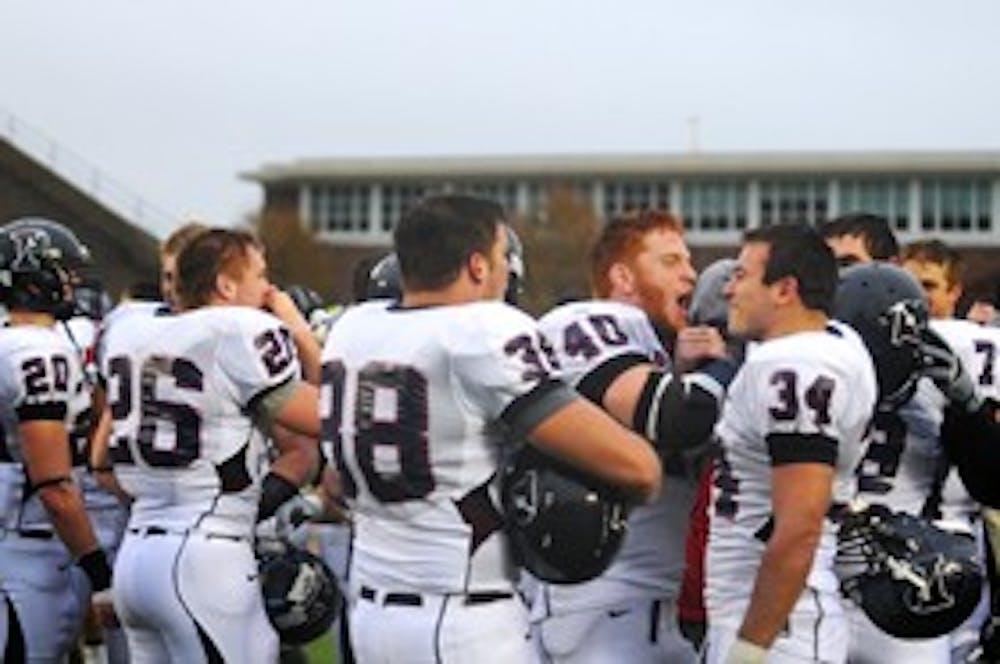
A brain autopsy of Penn football player Owen Thomas, who committed suicide in the spring, revealed that the standout lineman had developed a disease caused by repeated head trauma. Commonly experienced by football players, the disease has also been linked to depression.
Thomas, then a Wharton junior, hanged himself in his off-campus apartment in April, shortly after being elected captain of the football team for the 2010 season. The event took family, friends and teammates by surprise.
The brain autopsy was performed by researchers at Boston University, The New York Times reported Monday. The autopsy showed early stages of chronic traumatic encephalopathy, which has been found in over 20 deceased National Football League players. Thomas’ case is the first to be confirmed in a non-NFL player, and Thomas is the youngest known football player to develop the disease.
Thomas’ mother, Rev. Katherine Brearley, said the Sports Legacy Institute at BU approached her shortly after his death about doing an analysis of her son’s brain tissue.
“It was a shock to me. I said, ‘There isn’t any point in studying Owen’s brain because he never had concussions, so you’re never going to find anything,’” Brearley said.
Brearley described the double analysis in which doctors looked at Thomas’ brain at a microscopic level — a process she called “painstaking” — as well as his medical history.
Because CTE is caused by repeated brain trauma, such as concussive hits, the fact that Thomas has never had a diagnosed concussion adds a wrinkle to the current research of the disease, which has been linked to depression and dementia.
However, Dave Hovda, a neuroscientist at the University of California, Los Angeles, said players often overlook head injuries and concussions often go undiagnosed.
“Any young man that has played as hard as he has for as long as he has in high school and junior football and college football, he’s had his bell rung,” Hovda said. “He’s had a concussion.”
Though Brearley said that Thomas was never diagnosed with a concussion, she also said he “loved to hit” as a football player.
“Had I known that hitting people could lead to this, if nothing else, I would have said to him, ‘Owen you’ve got to think about this … and what it might be doing to you,’” she said.
According to the Times, doctors are hesitant to entirely attribute Thomas’ suicide to CTE caused by football injuries, especially given that Thomas died in a college atmosphere where suicide rates are elevated. However they do acknowledge the disease is a possible contributing cause.
Because a preliminary autopsy was performed in Philadelphia, researchers at Boston University only received parts of Thomas’ brain to study, Brearley said, which didn’t allow them to get “the complete picture.”
While attention to CTE and head injuries among professional players has increased over the last two years, Brearley expressed hope that the news of Thomas’ case will increase awareness of the risks associated with head injury in college-aged and younger athletes.
“There’s nothing trivial about this whatsoever,” his mother said. “Anyone who thinks that this can be swept under the carpet is in for a big shock. It’s a big implication here.”
Hovda said the Brain Injury Research Center at UCLA has made a “big impact” with the Bruins’ athletic department, which has put a strong emphasis on teaching players to get proper medical attention after sustaining head injuries.
“Our sports medicine people and trainers are up and aware of this,” he said.
He praised the NFL for finally hanging posters in locker rooms to train players about the risks of playing through head injuries, which can compound existing medical problems.
“I don’t see why they can’t do the same thing for college athletes,” he said. “There ought to be a mandatory training. It could be a DVD or online training, or at least a presentation to the football teams at the beginning of the season that this can be a problem.”
Penn, which is planning to honor Thomas before Saturday’s home opener against Lafayette, also acknowledged a need for increased attentiveness to head injuries.
“While we will never know the cause of Owen Thomas’ depression and subsequent suicide, we are aware of and deeply concerned about the medical issues now being raised about football head injuries and will continue to work with the Ivy League and the medical community in addressing these issues,” Penn spokeswoman Lori Doyle said in a statement.
Brearley said her family — in which Owen was a third-generation football player — doesn’t advocate any “dumbing down” of the sport but instead says players should be educated about ways to minimize the effects of head injuries, which are common in football.
“I think this can be changed,” she said. “The Ivy League teams are in a good position to step up and play a leadership role in this.”
The Daily Pennsylvanian is an independent, student-run newspaper. Please consider making a donation to support the coverage that shapes the University. Your generosity ensures a future of strong journalism at Penn.
DonatePlease note All comments are eligible for publication in The Daily Pennsylvanian.








